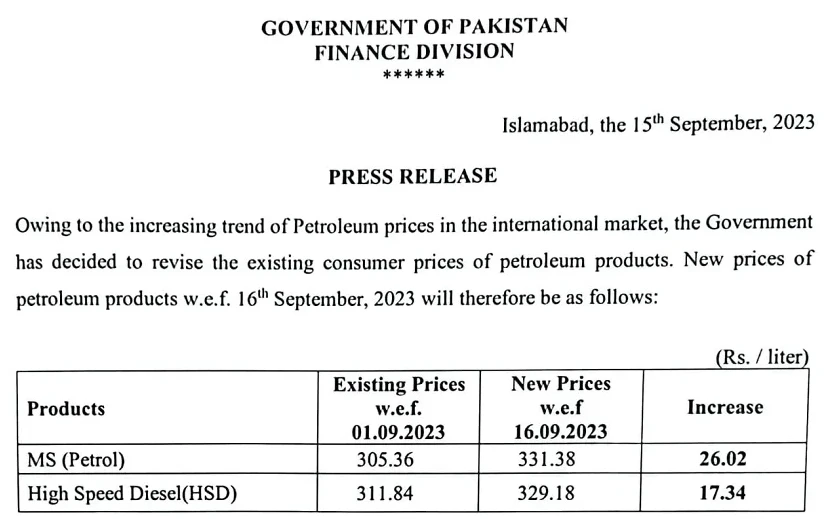With the summer season already behind us, a daydream of going on an exciting road trip may be in order for many people. But before you take that plunge, finding out what’s the latest petrol price in Pakistan for September 2023 is important to plot your course better. In this blog post, we will go over a comprehensive analysis of gas prices across Pakistan right now and the factors influencing them. Read ahead as we dive into looking at how much prices are likely to stay stable or increase within this month and beyond!
Latest Today Petrol Price in Pakistan
| Product | Existing Prices (September 01-15, 2023) | New Prices (For September 16-30, 2023) | Increase |
| MS (Petrol) | Rs 305.36 | Rs 331.38 | Rs 26.02 |
| High-Speed Diesel (HSD) | Rs 311.84 | Rs 329.18 | Rs 17.34 |
As of today, the petrol prices in Pakistan have seen a significant increase. The price for MS (Petrol) has risen from its existing rate of Rs 305.36 (for the period September 1-15, 2023) to Rs 331.38 (for the period September 16-30, 2023). This is an increase of Rs 26.02. Similarly, the price of High-Speed Diesel (HSD) has increased from Rs 311.84 to Rs 329.18, marking a rise of Rs 17.34. This hike in fuel prices is expected to have a ripple effect on the economy, potentially influencing the cost of transport and commodities.
Latest New Petrol Price in Pakistan For Next 15 Days September

The latest petrol prices in Pakistan for the period of September 16-30, 2023, have been released. For the second half of September, Motor Spirit (Petrol) prices have been increased by Rs 26.02, bringing the new price up to Rs 331.38 from the previous price of Rs 305.36. In addition, the price of High-Speed Diesel (HSD) has seen an increase of Rs 17.34, moving the price to Rs 329.18 from the existing rate of Rs 311.84. This surge in prices is likely to affect a broad spectrum of the economy, from individual consumers to businesses reliant on these fuels.
The higher costs of petrol and diesel could potentially lead to an increase in other products, including food items, as businesses will need to pass on the cost of their fuel expenditure. The government is likely to face criticism over this sudden surge in prices, and how it has impacted people’s livelihoods. It remains to be seen what measures the government takes in order to mitigate the effects of this price increase. Some experts believe that tax reductions, or other incentives, may be offered to help soften the blow for consumers.
As the prices of petrol and high-speed diesel rise dramatically, citizens across Pakistan are left grappling with the implications. The increase, which marks the second major price hike in just a month, has caused widespread concern and criticism. From transporters to farmers, the steep rise in fuel costs is expected to ripple through most sectors of the economy, leading to potential price increase in goods and services. As the nation anticipates the effects of this development, there’s a palpable sense of unease, particularly among those who depend heavily on these fuels for their daily operations. While the government cites fluctuations in the global petroleum market and exchange rates for this surge, the public outcry suggests a growing apprehension about its impact on the cost of living. As we move into the latter half of September 2023, the country waits to see how the government will alleviate the burden of these skyrocketing prices.
As summer recedes, the idea of a thrilling road trip may be a tantalizing prospect. But before you embark on such a journey, it is imperative to familiarize yourself with the current petrol prices in Pakistan for September 2023. This article aims to provide a detailed analysis of the prevailing petrol prices across the country and the factors influencing them. So, let’s delve into the dynamics of fuel pricing and evaluate the likelihood of stability or further increases in the future.
As of now, petrol prices in Pakistan have experienced a significant surge. MS (Petrol) prices rose from Rs 305.36 per litre (for September 1-15, 2023) to Rs 331.38 per litre (for September 16-30, 2023), marking a sharp increase of Rs 26.02. Likewise, High-Speed Diesel (HSD) prices have escalated from Rs 311.84 to Rs 329.18 per litre, an upward shift of Rs 17.34. This substantial hike in fuel prices is projected to ripple across the economy, influencing transportation and commodity costs.
During the latter half of September 2023, MS (Petrol) prices have jumped by Rs 26.02, elevating the new price to Rs 331.38 from the prior rate of Rs 305.36. Concurrently, HSD price has witnessed a rise of Rs 17.34, pushing the cost up to Rs 329.18 from Rs 311.84. This price surge is apt to affect a wide array of the economy, from individual consumers to businesses dependent on these fuels.
The escalated costs of petrol and diesel could potentially result in a price hike for other products, including food items, as businesses may pass on their increased fuel expenditure. Government criticism is likely to escalate over this abrupt price surge and its impact on people’s livelihoods. It awaits to be seen what actions the government will undertake to alleviate the effects of this price hike. Some experts speculate that tax reductions or other incentives may be introduced to cushion the blow for consumers.
As the prices of petrol and high-speed diesel soar, citizens across Pakistan are grappling with the repercussions. This increase, marking the second significant price hike within a month, has elicited extensive concern and criticism. From transporters to farmers, this steep fuel price rise is anticipated to ripple through numerous economic sectors, potentially leading to a price increase in goods and services. With this development, a sense of unease is palpable, particularly amongst those heavily dependent on these fuels for their daily operations. Although the government attributes this surge to fluctuations in the global petroleum market and exchange rates, public outcry indicates a burgeoning apprehension concerning its impact on the cost of living. As we transition into the latter half of September 2023, the nation awaits the government’s strategy to mitigate the burden of these soaring prices.




